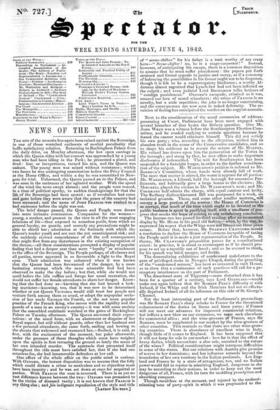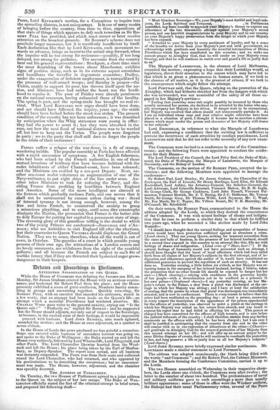Next to the consideration of' the usual ceremonies of address-
presenting at Court, Parliament have been most engaged with several branches of that hydra the Bribery question. One Mr. JOHN WREN was a witness before the Southampton Election Com- mittee, and he evaded replying to certain questions because he feared the answer would criminate himself. This did not satisfy his own party ; who, according to the allegation, wished him to abandon truth in the cause of the Conservative candidates, and so to shape his evidence as to secure the return of Mr. MARTI-N. His refusal has drawn upon him the persecution of the Tories in the borough ; and stung by that, he now offers to make important disclosures if indemnified. The writ for Southampton has been suspended for a fortnight longer, in order to the further considera- tion of the subject. Mr. WARBURTON 'S petition is referred to Mr. ROEBUCK'S Committee, whose hands were already full of work. The more that matter is stirred, the worse it appears for all parties: Mr. WARBURTON, a Liberal, held the borough for successive Par- liaments, and habitually gave a large bonus to the electors ; Mr. MITCHELL played the cuckoo in Mr. WARBURTON'S nest ; and Mr. COCHRANE half admits the charge, with equal candour and levity. The Sudbury disfranchisement Bill was postponed for a week, on technical grounds. These, and some other smaller matters,. will occupy a large portion of the session : the House of Commons is so corrupt, that much of the time which ought to be devoted to the public business is spent in purifying itself, with a smallness of pro- gress that mocks the hope of coming to any satisfactory conclusion. The Income-tax has passed its third reading, after an economical display by Mr. HUMS in his good old fashion-.-when, by the way, he expressed his regret that the Whigs were not tinned out three years sooner. Before that, however, Mr. SHARM&N CRAWFORD moved a resolution to declare the House of Commons incapable of taxing the People until it is made a just representation of the People. In theory, Mr. CRAWFORD'S proposition passes for a constitutional axiom: in practice, it is about as extravagant as if he should pro- pose to set up a republic out of hand ; and so he seemed to think, for his speech was brief, meagre, and feeble.
The demoralizing exhibitions of condemned malefactors to the gaze of privileged mobs in Newgate Chapel,during the preaching of the " condemned sermon," has been so censured in each House, as to show that a continuance of such practices will call for a pe- remptory interference on the part of Parliament.
The disordered state of Tipperary-more disturbed than it has been for a quarter of a century, says Lord GLENG ALL-would make one again believe that Sir ROBERT PEEL'S difficulty is with Ireland, if the Whigs and the Irish Members had not so effectu- ally deprived Ireland of all its influence on this side of St. George's Channel.
Not the least interesting part of the Parliament's proceedings was Sir ROBERT PEEL'S sharp rebuke to France for the threatened enhancement of the duties on linens and linen yarns : if France will not meet our advances for improved commercial relations, but inflicts a new blow on our commerce, we mast seek elsewhere for commercial allies ; and the wine-growers of France, says Sir ROBERT, must be supplanted in our market by the wiue-growers of other countries. This reminds us that there are other wine-grow- ing countries. There is abundance of excellent wine in Italy, though little of it comes to England. It has been supposed that it will not keep for sale in our market : bow far is that the effect of heavy duties, which necessitate a slow sale, unsuited to the nature of the wines ? Political considerations might interpose difficulties in some of the states. But our relations with Austria give promise
of access to her dominions ; and her influence extends beyond the boundaries of her own territory in the Italian peninsula. Let Eng- land and France be in a state of antagonism, too, and no Italian power would fail to rejoice in admitting England, dangerous as she may be according to their notions, in order to keep out the most dangerous of all, France, with its turn for meddling proselytism and absorbing conquest. Though resultless at the moment, and injured by the undiscri- minating tone of party-spirit in which it was propounded to the Peers, Lord KINNAIRD'S motion, for a Committee to inquire into the spreading distress, is not unimportant. It is one of many modes of bringing before the country, from time to time, expositions of that state of things which appears to defy such remedies as Sir Ro- 13ERT PEEL has provided, and which must sooner or later receive attention on the broadest grounds. Sir ROBERT'S scheme does not preclude larger measures, but it is manifestly insufficient by itself. Each declaration like that by Lord KINNAIRD, each movement to- wards an advance, brings us nearer to the actual step forward, when the impulse will be too strong for resistance—possibly, if too long delayed, too strong for guidance. The accounts from the country bear out his general representations: Stockport, a short time since the most flourishing of the towns about Manchester, exhibits signs of positive decay, such as in its extreme aspect astonishes and humiliates the traveller in degenerate countries; Dudley, under the exasperation of deficient employment, is tranquillized by the presence of well-armed troops ; and Burnley is pauper—the Union, unable to support its poor, has thrown itself upon the na- tion, and Ministers have had neither the heart nor the hardi- hood to repulse it. The poor of Paisley were already pensioners on the national resources, having exhausted those of the locality. The spring is past, and the spring-trade has brought no real re- vival. What Lord KINNAIRD now urges should have been done, and act should have followed the inquiry, years ago : the stable should have been locked before the steed was stolen. The present condition of the country has not been unforeseen ; it was described by anticipation when the Whig statesmen were young in office : they had the power to avert it ; but they were absorbed in the care, not how the next flood of national distress was to be warded off, but how to keep out the Tories. The people were forgotten in party : wo to the party that shall still dare to forget the people in the crisis of their endurance !



























